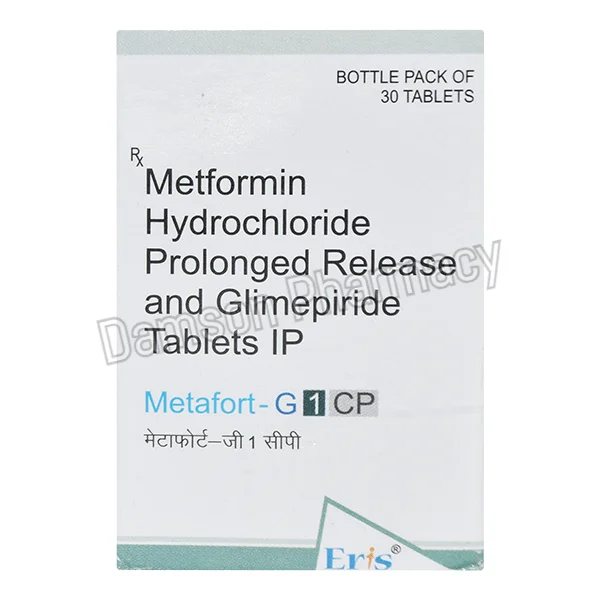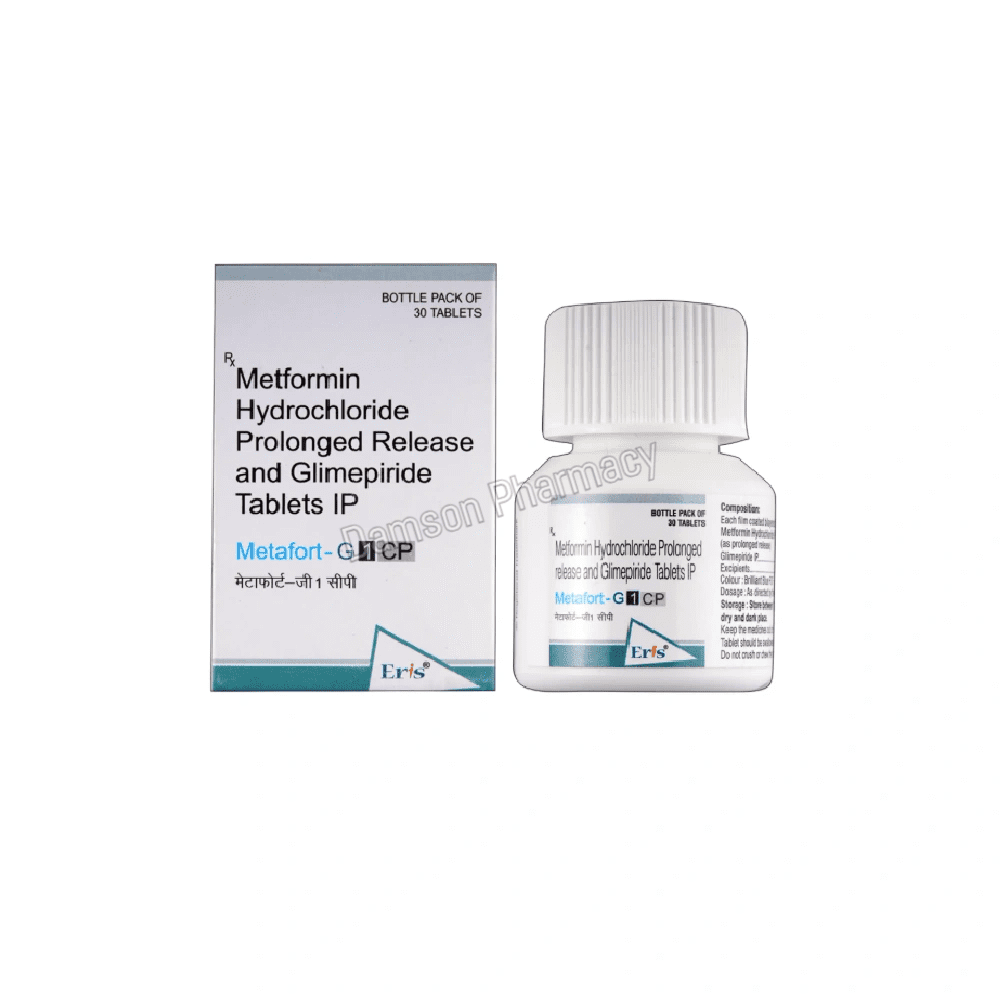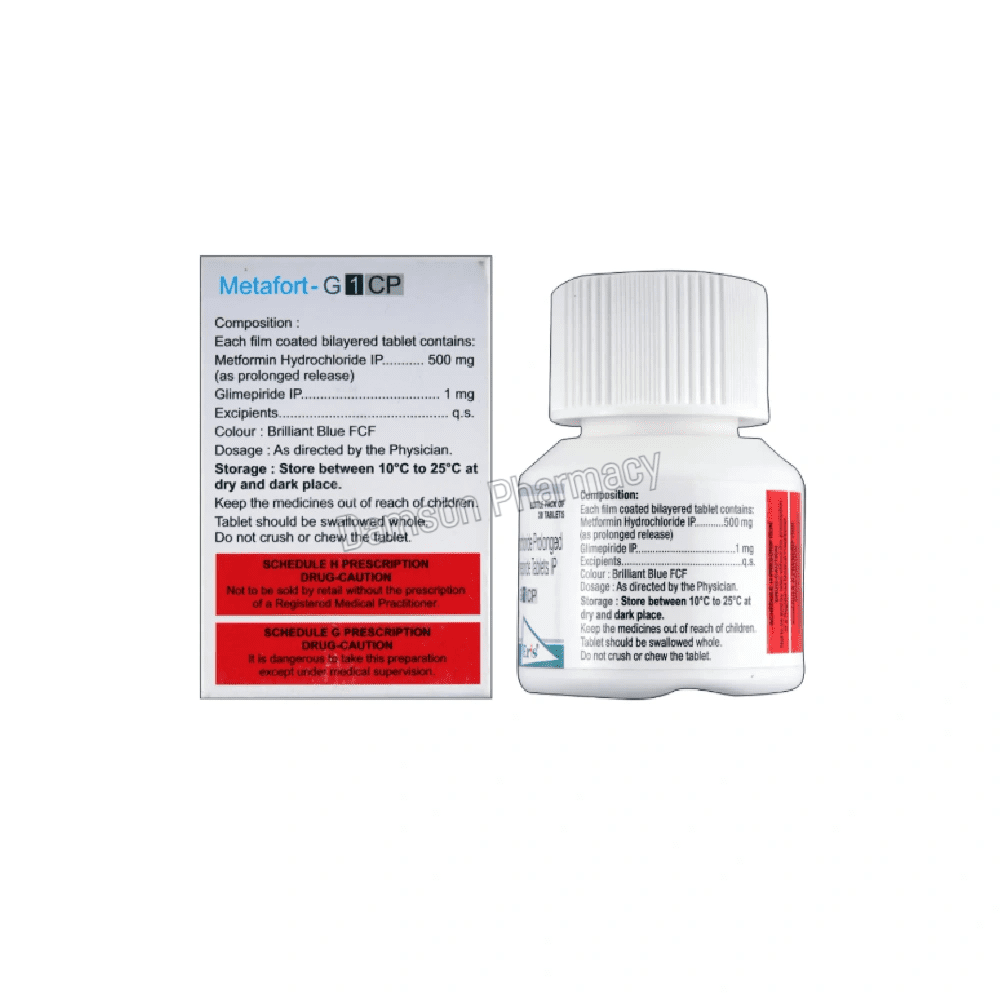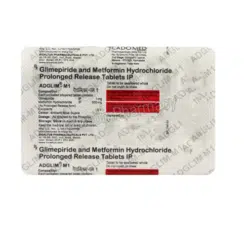Metafort G1 CP Tablets
$18.00 – $36.00Price range: $18.00 through $36.00
Metafort G1 CP is used to treat Type 2 Diabetes. It contains Metformin and Glimepiride, which work together to lower blood sugar levels by improving insulin sensitivity and increasing insulin release from the pancreas.
| Pack Size | Price | Price / Unit | Quantity | |
|---|---|---|---|---|
| 180 Tablets | $36.00 | $0.20/ unit | ||
| 120 Tablets | $30.00 | $0.25/ unit | ||
| 60 Tablets | $18.00 | $0.30/ unit |
Looking for bulk / B2B pricing? | Send Inquiry |

| SKU | 11206 |
| Manufacturer | Eris Lifesciences Ltd |
| Categories | Diabetes |
| Delivery Time | 10 - 14 Working Days |
| Strength | 1mg + 500mg |
Introduction to Metafort G1 CP Tablet
Metafort G1 CP Tablet is a prescription medication commonly used to manage type 2 diabetes mellitus in adults. It combines two active ingredients: Glimepiride (1 mg), a sulfonylurea that stimulates the pancreas to release more insulin, and Metformin (500 mg), a biguanide that reduces glucose production in the liver and enhances insulin sensitivity in body tissues .
This dual-action approach helps in effectively lowering elevated blood sugar levels, especially when diet, exercise, or monotherapy with either drug is insufficient. Patients are typically advised to take Metafort G1 CP Tablet orally with meals to minimize gastrointestinal discomfort.
It is important to use Metafort G1 CP Tablet under medical supervision, particularly for individuals with kidney, liver, or heart conditions. Alcohol consumption should be avoided, as it can increase the risk of lactic acidosis, a rare but serious complication associated with metformin.
Uses of Metafort G1 CP
- Control of Blood Sugar Levels
- Prevention of Diabetes Complications
- Supplement to Diet and Exercise
How Does Metafort G1 CP Works?
Metafort G1 CP controls blood glucose levels, where glimepiride works by increasing the amount of insulin released by the pancreas in order to lower the blood glucose. Metformin works by lowering glucose production in the liver, delaying glucose absorption from intestine, and increasing the body’s sensitivity to insulin.
Side Effects of Metafort G1 CP
Common Side Effects
- Nausea or vomiting
- Diarrhea
- Stomach pain or cramps
- Loss of appetite
- Metallic taste in the mouth
- Dizziness
- Sweating
- Shakiness or trembling
Serious Side Effects
- Deep, rapid breathing
- Extreme fatigue or weakness
- Muscle pain
- Drowsiness or dizziness
- Cold or blue hands/feet
- Irregular heartbeat
- Nausea or vomiting that doesn’t go away
How to Manage Side Effects?
- Contact your healthcare provider
- Follow prescribed dosage
- Take with food
- Stay hydrated
- Avoid alcohol and certain substances
- Monitor your symptoms
- Do not stop abruptly
- Attend regular check-ups
Dosages of Metafort
Warnings & Precautions
Here are the key warnings and precautions for taking Metafort G1 CP Tablet safely:
1. Kidney Function:
- Metformin is cleared through the kidneys. If kidney function is impaired, the drug may build up in the body and increase the risk of lactic acidosis, a rare but serious condition. Kidney function (creatinine levels or eGFR) should be tested before starting treatment and monitored regularly.
2. Liver Impairment:
- Liver problems can also raise the risk of lactic acidosis and may affect how the drug is metabolized. Avoid use or proceed with caution if you have liver disease.
3. Alcohol Use:
- Excessive alcohol increases the risk of lactic acidosis and hypoglycemia. Avoid alcohol or use it in moderation, only with your doctor’s approval.
4. Risk of Hypoglycemia:
- Glimepiride can cause low blood sugar, especially if you skip meals, overexercise, or combine it with other diabetes medications. Always take with meals and monitor blood sugar levels regularly.
5. Pregnancy and Breastfeeding:
- The safety of this medicine during pregnancy and breastfeeding is not well established. Use only if prescribed by a doctor; insulin is often preferred during pregnancy.
6. Surgery and Imaging Tests
- Metformin should be temporarily discontinued before certain surgeries or contrast dye procedures, as they can affect kidney function. Inform your healthcare provider if any such procedure is planned.
Storage
- Store at room temperature, typically between 15°C to 30°C (59°F to 86°F).
- Store the tablets in a cool, dry place.
- Avoid bathrooms and other damp areas.
- Keep the medicine in its original packaging to protect it from light and moisture.
- Do not leave the medication out in the open, especially if children are around.
- Do not use the medicine after its expiration date.
- Do not flush it down the toilet. Dispose of it through a pharmacy take-back program or according to local disposal guidelines.
Frequently Asked Questions
1. Can I stop taking Metafort G1 CP if my blood sugar is normal?
No. Diabetes is a chronic condition. Never stop or change your dose without your doctor’s guidance, even if your sugar levels are well-controlled.
2. What should I do if I miss a dose?
Take the missed dose as soon as you remember, but skip it if it’s almost time for the next dose. Do not double dose to make up for a missed one.
3. Can I drink alcohol while taking Metafort G1 CP?
No. Alcohol increases the risk of lactic acidosis (a rare side effect of Metformin) and low blood sugar, so it should be avoided.
4. Is Metafort G1 CP safe during pregnancy?
It is not usually recommended during pregnancy. Insulin is typically preferred. Consult your doctor if you are pregnant or planning to become pregnant.
| Pack Size | 180 Tablets, 120 Tablets, 60 Tablets |
|---|---|
| Price/Unit | $0.20/unit, $0.25/unit, $0.30/unit |
3 reviews for Metafort G1 CP Tablets
Add a review Cancel reply
Related Products
Diabetes
Diabetes
Diabetes












Jeffy –
very pleased with service definitely recommended
Nejan –
Convenient and Reliable…😊
Nolan –
Accurate and Convenient